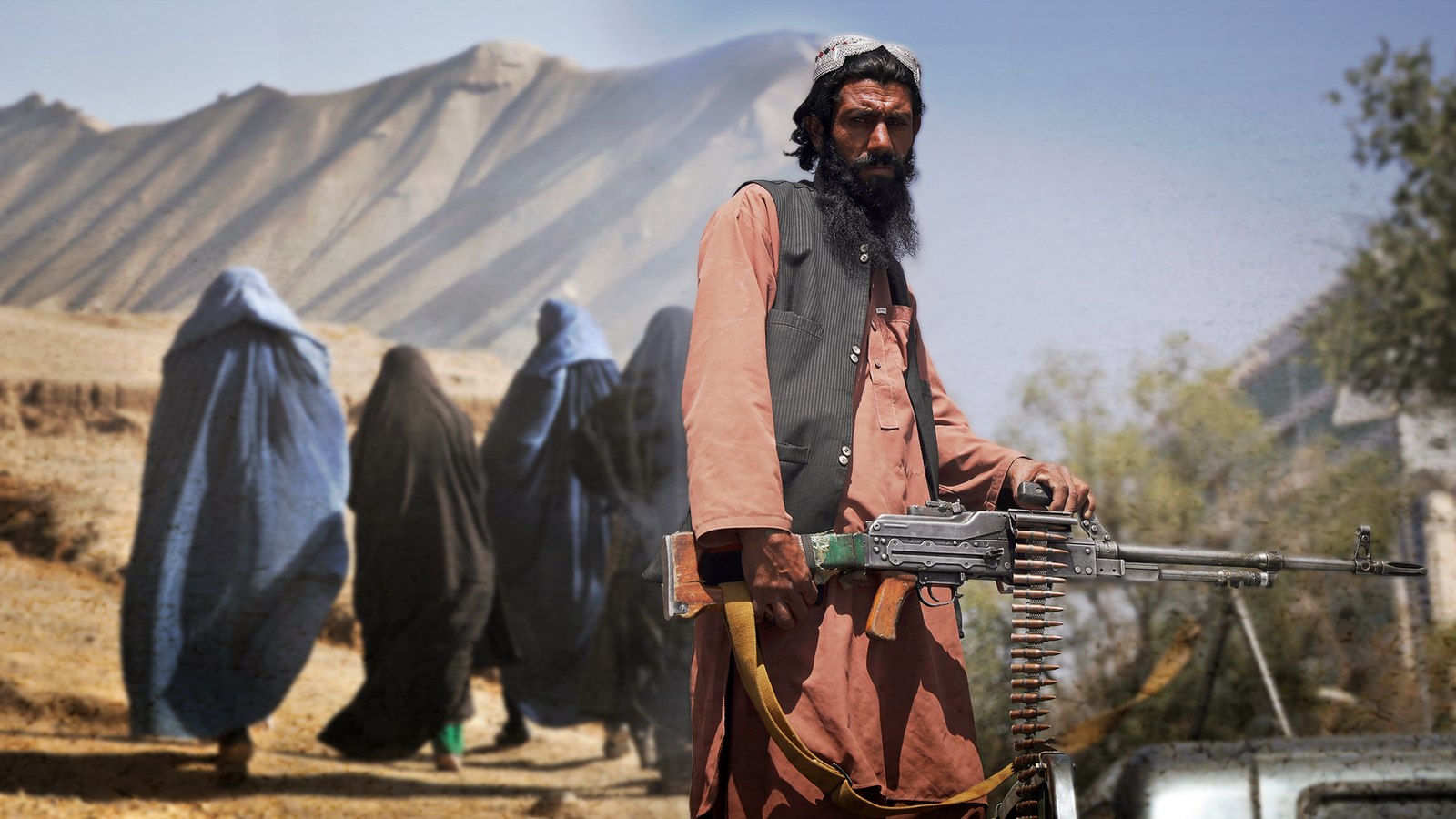The Taliban has said it will allow Afghan women and girls to work, have an education and go about their daily lives as normal.
On Tuesday, two days after seizing the capital Kabul to complete their takeover of the country, a Taliban spokesman told Sky News women can continue to be educated up to university level and will not have to wear a burka – full face and body covering – but will have to wear a hijab (headscarf) “for their own security”.
A female TV anchor interviewed a Taliban official on camera in Afghanistan on Tuesday but many do not believe they have changed and are scared for the lives they have built up over the two decades since the Taliban last ruled.
Please use Chrome browser for a more accessible video player
How has the Taliban treated women in the past?
When the group were in power from 1996 to 2001 women were effectively put under house arrest as they were not allowed to work or have an education.
Women and girls from the age of eight had to wear a burka and had to be chaperoned by a male relative to be out on a street, and even to visit the doctor.
High-heeled shoes were not allowed in case it excited a man and no stranger was allowed to hear a woman’s voice so they could not speak loudly in public.
Homes with windows on the ground and first floor had to be painted over and women were forbidden to go on their balconies so they could not be seen from the street.
And photographing, filming or displaying pictures of females in newspapers, books, shops or the home was banned.
Even place names that had “women” in were changed and women were banned from appearing on radio, TV or at public gatherings.
Women were not allowed to ride bicycles or motorcycles, even with a chaperone, could not get a taxi without a chaperone and bus services were made male or female only.
Any women disobeying the rules, even if they had no male relatives to go outside with, were flogged in the street or in stadiums and town halls.
Women had their thumb tips cut off for wearing nail varnish and were stoned to death if they refused to declare loyalty to the Taliban.
Men were also punished for women not adhering to the rules.
Please use Chrome browser for a more accessible video player
Where do the Taliban’s views on women come from?
They claim it is Islamic law.
Taliban officials “justify their rules in terms of Islam despite many senior Taliban policymakers having limited religious knowledge,” said Larry Goodson, author of Afghanistan’s Endless War.
Pakistani journalist and Taliban expert Ahmed Rashid said: “For the Taliban, anyone questioning these edicts, which have no validity in the Koran, is tantamount to questioning Islam itself, even though the Prophet Mohammed’s first task was to emancipate women.
“[The Taliban believed they] were right, their interpretation of Islam was right and everything else was wrong.”
Islamic law does not require the segregation of women from all males other than close family members.
But it is seen in the traditional behaviour of rural Pashtuns who traditionally separated girls who have reached puberty from males.
The Koran calls for modest clothing but does not specify a burka needs to be worn.
And there is no stipulation under Islamic doctrines to prevent women from working, with a long tradition of women working in important positions in Afghan society.
Were Afghan women free from fear of the Taliban over the past 20 years?
When the Taliban was overthrown in 2001, Afghan women and girls were allowed to work, go to school and be in government.
However, Taliban violence did not stop entirely.
Homira Rezai, a human rights activist and scientist who grew up in Afghanistan and moved to the UK when she was 13 years old, told Sky News: “Even though they weren’t fully controlling the Afghan government, they were still in Afghanistan.
“The violence of the Taliban, we experienced this in the past 20 years, even when the American allies were there, the targeted killings of the Taliban against women, human rights defenders, journalists, ethnic minorities, religious minorities, it never stopped.
“So the fear that people have towards the Taliban, it’s it hasn’t changed since the 90s.
“Even though the majority of Afghans are under the age of 25 and didn’t fully experience the violence of Taliban, the fear is still instilled in them.”
Do Afghans believe the Taliban will allow women to be free?
No.
Hosna Jalil, former Afghan deputy minister of women affairs, now in Washington, told Sky News: “They give reassuring messages on giving women their basic rights but their actions on the ground are different.
“They’re afraid of the fact they might be giving these reassuring messages to makes sure the Taliban has a peaceful transfer of power and as soon as international forces are out of Afghanistan, all the doors will be shut for them.
“I share the same fear, I spent my childhood under the Taliban regime, I would say they will adopt the same policies they adopted during the first Taliban regime – and it may be more brutal than what it was.”
Please use Chrome browser for a more accessible video player
Ms Jalil added that the Taliban cannot change the principles and values it has had for so many years as that is how they have convinced their fighters to fight for them.
“So it honestly doesn’t make sense that the Taliban would change their policies towards women, towards children, and their basic rights,” she said.
Ms Rezai agreed and said: “I don’t think that we should believe any word that’s coming out of the Taliban. They are a terrorist group. We should not be believing a terrorist group.
“They are more violent, they’re worse than before. They don’t know how to run a country, they’re using violence to control people.”
Has there been evidence of the Taliban targeting women as it re-captured Afghanistan?
Despite the Taliban saying women should join their government and a female presenter interviewing a spokesman on TV, there have been many accounts of the group targeting women in the week and a half it has taken to seize Afghanistan.
Ms Rezai said: “They are saying that they’re allowing women to enter or work in the government. But we see a difference in Herat.
“They prevented women from going to university, they stopped women from going into their offices.
“Women from across the country are now in hiding, especially those who are human rights and women’s rights defenders.
“They are targeting these women. They are going house to house, searching for these women.”
She said a lot of women she has spoken to are destroying any documents showing they have worked with international agencies, as well as their university certificates.
They are even destroying their digital footprints and are also going into hiding.
Ms Jalil said women she has been in touch with in Herat have not been able to go to university or school since the Taliban took the city on 12 August, and women have not been able to work in government offices.






















